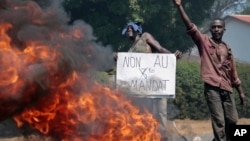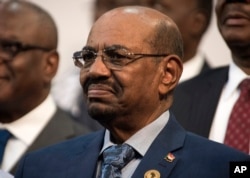African leaders meeting at a summit in South Africa have agreed to send military experts to Burundi, following weeks of violent protests there sparked by the president's decision to run for a third term.
Officials at the African Union summit say the experts will observe what is happening in Burundi and will be able to give advice to police officers.
The protests in Burundi began after President Pierre Nkurunziza said he will run for a third term as president. Critics say that would violate a two-term limit in the constitution, but his supporters say he is eligible to run again because he was appointed by lawmakers to his first term in office and not elected by a popular vote.
U.S. Assistant Secretary of State for African Affairs Linda Thomas-Greenfield told VOA on the sidelines of the AU summit that the upheaval in Burundi is a direct result of the president seeking a third term.
"We think that this is a clear political decision and we keep hearing from the region and from others that it has to do with the constitution, but there is nothing in the Burundi constitution that says that the president must run for president for a third term," she said. "It is a decision that he is making and it is having a detrimental effect on the country."
The two day-meeting of African heads of state was overshadowed by the controversy of Sudanese President Omar al-Bashir, who defied a South African court order to remain in the country until it decided whether he should be arrested on international charges of war crimes and genocide.
The summit, which ended Monday, touched on a wide range of issues, including African migrants who are fleeing the continent,and proposals for a continental free trade area.
AU chairperson Zimbabwe President Robert Mugabe launched the Continental Free Trade Area negotiations Monday, saying a free-trade zone is essential in promoting the movement of goods and people within the continent.
Kenyan President Uhuru Kenyatta hailed the start of negotiations as a critical step toward reducing poverty and doubling the continent’s economic development.






